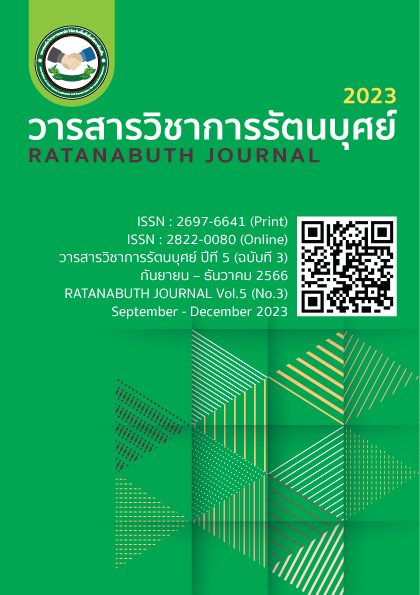THE The Educational Paradigm According to the Thai Qualifications Framework for Higher Education in 2022 The Educational Paradigm According to the Thai Qualifications Framework for Higher Education in 2022
Main Article Content
Abstract
The new educational paradigm continuously generates new knowledge, necessitating a lifelong learning approach. Particularly, adapting to the evolving global context requires education management technologies that align with the changing world. Current education curricula tend to emphasize shorter learning periods. Therefore, technology plays a crucial role in shaping education in the 21st century. The emerging trend in education is centered around fostering creative thinking skills, strengthening technological competencies, and utilizing media and information systems for educational management. Teachers must incorporate technology and information resources as teaching aids to swiftly reach a large number of learners. Moreover, they should consider real-world contexts and collaborative interdisciplinary teaching through project-based learning. Developing problem-solving skills and using appropriate assessment tools are also essential components of this evolving approach. This shift aims to steer society towards sustainable and joyful development. The Thai education system requires a transformation from traditional educational paradigms towards new management systems. The new educational paradigm necessitates the preparation of Thai teachers for the 21st century, including digital technology skills to enhance the efficiency of learning in the digital age and elevate the quality of education in Thailand.
Article Details

This work is licensed under a Creative Commons Attribution-NonCommercial-NoDerivatives 4.0 International License.
References
ธนชาติ นุ่มนนท์ (2565). ยุทธศาสตร์ธุรกิจยุคใหม่. กรุงเทพฯ:ไอเอ็มซี เอ้าท์ซอร์สซิ่ง.
พัชรียา อิ้ววังโส. (2566). สาเหตุที่การศึกษาไทยไม่พัฒนา. ยโสธร: เอกสารประกอบการสอนรายวิชา-การวัดและประเมินผลการศึกษา, (อัดสำเนา), วิทยาลัยศาสนศาสตร์ยโสธร.
พูลศักดิ์ หอมสมบัติ และคณะ. (2565). การจัดการเรียนรู้ที่เน้นคุณสมบัติอันพึงประสงค์ตามกรอบมาตรฐานคุณวุฒิระดับอุดมศึกษาแห่งชาติ สำหรับนิสิตคณะครุศาสตร์ มหาวิทยาลัยมหาจุฬาลงกรณราชวิทยาลัย. Journal of MCU Ubon Review, 7(3), 145-162.
รักษิต สุทธิพงษ์. (2560). กระบวนทัศน์ใหม่ทางการศึกษากับการพัฒนาครูไทยในยุคดิจิทัล.Journal of Education Naresuan University, 19(2), 344-355.
อาภรณ์ รัตน์มณี. (2553). ทำไมระบบการศึกษาไทยจึงพัฒนาช้า. ยโสธร: เอกสารประกอบการสอนรายวิชาการวัดและประเมินผลการศึกษา (อัดสำเนา) วิทยาลัยศาสนศาสตร์ยโสธร.
Anuphabsaenyakorn, P. (2012). Learning Management : The project for the 60thanniversary his royal highness crown prince maha vajiralongkorn in northerneast rajabhat universities. mahasarakam: mahasarakam rajabhat university.
Ihoctot. (2566). การศึกษาไทยในปัจจุบัน 2565. ยโสธร: เอกสารประกอบการสอนรายวิชาการวัดและประเมินผลการศึกษา (อัดสำเนา) วิทยาลัยศาสนศาสตร์ยโสธร.
Kiatchokchai, P. (2002). The new paradigm of education in the 21st century. Bangkok: Education Press. (in Thai)
Kiatchot, P. (2002). New Educational Paganism Shifts in the 21st Century. Bangkok: Education.
Khuana, K. & Khuana, T. (2016, January-June). Informal Education for the 21st Century.education journal faculty of education Kamphaengphet rajabhat university.
Panich, W. (2014). Initializing Learning into the 21st Century. Bangkok:Siam Kammachom Foundation.
Parnichparincha, T. (2016, May-August). transformative learning: A learning management in pre-service teacher training. the golden teak: Humanity and Social Science Journal. (GTHJ.)
Sanrattana, W. (2013). A new paradigm for education: Case studies toward the 21st century. Bangkok: Thipayawisut. (in Thai).
Thanaphonphan, R. (2001). Education capitalism and globalization. Bangkok: Kobfai Books. (in Thai).


